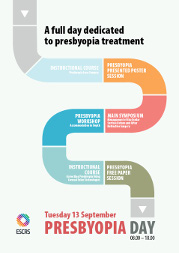Posters
Changes in ocular surface after succeed filtration surgery
Poster Details
First Author: E. Conesa Hernández SPAIN
Co Author(s): E. Mata Diaz C. Monton Jimenez C. de Pablo Martin A. Sanchez Ventosa
Abstract Details
Purpose:
Glaucoma is a chronic disease with long-term instillation of preserved eye-drops that can damage ocular surface after years of topical treatment, including symptomatic eye dryness and several degrees of squamous metaplasia. The purpose of this study is to evaluate how ocular surface condition may change in patients with glaucoma after Express Implant surgery and topical therapy abandon.
Setting:
Importance of good ocular surface conditions, especially in glaucoma patients, related to a better quality of life.
Methods:
A prospective study of 40 eyes (20 patients) with long-term open-angle glaucoma was performed from 2013 to 2015 in two hospitals of Madrid (Hospital Universitario Infanta Sofía and Hospital Central de la Cruz Roja) for this study. . Patients underwent an objective ophthalmic examination including Tear film break-up time (BUT), Schirmer test and fluorescein staining. Subjective evaluation was assessed by the Ocular Surface Disease Index (OSDI) questionnaire. Posteriorly, all patients had filtration surgery (Express Implant without phacoemulsification) in both eyes stopping topical medication, and after 1, 6 and 12 months, they were newly evaluated with the same procedure.
Results:
All patients completed the study and had a significant reduction in intraocular pressure (IOP) after the filtration surgery. There was no statistically significant difference in the mean values of BUT and Schirmer test post surgery. There was a statistically significant decrease in fluorescein staining and ocular surface disease index score at 6 and 12 months, indicating less severity of dry eye symptoms and significant reduction in ocular discomfort.
Conclusions:
Filtration surgery allowed stopping topical treatment, decreasing IOP in all patients. It had no effect on postoperative values of BUT and Schirmer tests but improved subjective ocular surface symptoms in these patients.
Financial Disclosure:
NONE





